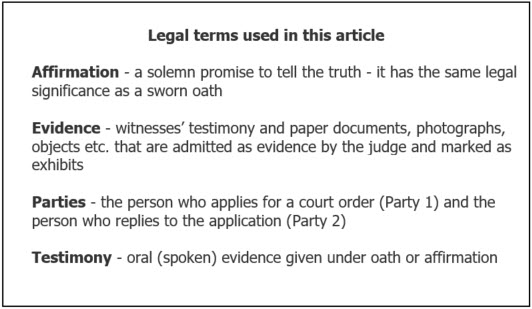Available as a podcast!
Note: Family Management Conferences are being conducted by telephone, audio- or video-conference. Be sure to read the NP 21 Virtual Proceedings and Remote Attendance in the Provincial Court before your conference.
You’ve filed a family law matter application in BC Provincial Court, or you’ve filed a reply to an application. The Court has given you a date and time for a Family Management Conference. What happens at a Family Management Conference? How will it work? How should you prepare?
This eNews answers these and other questions about Family Management Conferences.

What is a Family Management Conference?
Put very simply, it’s a meeting with the other party and a judge to sort a few things out until you can resolve the issues between you by agreement or with a trial (also called a hearing). While it’s sometimes possible to resolve all the issues between parties at a Family Management Conference, they are primarily designed to stabilize a family’s situation until major issues can be resolved, and to help parties begin to prepare to resolve those issues.
The time available for a Family Management Conference will differ depending on the court location, but it is generally expected to take between 30 and 60 minutes.
Are there steps I have to take before I can have a Family Management Conference?
People must take different steps before filing an application about a family law matter or before getting a date for a Family Management Conference, depending on their court location. You might need to do one or more of these things:
• take part in a Family Needs Assessment by a Family Justice Counsellor
• complete a parenting education course
• take part in at least one Consensual Dispute Resolution session
See What you need to know about the new Provincial Court Family Rules to find out if any of these steps are required at your court location and learn what they involve.
What is likely to happen at a Family Management Conference?
The Family Management Conference gives you and the other party a chance to work with a judge to deal with your family court issues. You can expect some or all of these things to happen at your conference:
- The judge may work with you to try and reach agreement on some or all of the issues. If you and the other party agree, the judge can make a final* order. If you agree on all issues, proceedings on the application are finished and you won’t need to attend court again.
*Although orders are called “final”, a judge can change them if circumstances change in the future.
- The judge may make interim (temporary) orders with or without the parties’ agreement. You can tell the judge at the conference what orders you think should be made and why. The judge may be able to decide on interim orders during your conference or they may direct that time be set for a hearing on interim orders.
If the judge is able to consider interim orders during the conference, you may need to provide brief evidence to support your position. Evidence might be accepted in one of two ways:
- spoken testimony - the judge may have you affirm that your evidence is true and then hear you speak briefly about the facts relevant to the interim order being requested
- affidavit evidence - although the judge will likely not have time to read long documents, you may file a short affidavit with the court registry before the conference and give the other party a copy of it
The judge might consider the evidence presented and make an order that lasts until a new order is made. A new order could be either a consent order made by agreement or a final order made after a trial.
- When all issues are not resolved at the conference, the judge will decide on the next steps in your court matter. The judge might, for example, direct you to:
- participate in mediation or other consent dispute resolution
- attend counselling or another community resource
- attend another Family Management Conference
- attend a Family Settlement Conference if the judge thinks a final order by consent is possible
- set a trial date
Before the conference, think about what witnesses you might wish to call if you need a trial. The judge will need that information to make an accurate time estimate for the trial.
-
The judge may make orders that the parties exchange documents or other evidence. This can help you in discussing and agreeing on issues with the other party. It will also help ensure that a trial works fairly and efficiently if a trial is needed.
-
The judge may also make orders about how the trial will proceed (for example, orders about timing and witnesses).
It is very important to listen and speak respectfully to one another and not interrupt each other or the judge at a Family Management Conference. Your time with the judge is limited and you need to focus on getting issues resolved and stabilizing your family’s situation.
Do I need to have a lawyer at my Family Management Conference?
You don’t need to have a lawyer at a Family Management Conference, but you may find it very helpful to speak to a lawyer about your case before you attend. A lawyer can advise you of your chances of success if your case goes to trial, tell you about evidence you will need, and suggest reasonable possibilities for settlement.
The Notice you receive about your conference date includes contact information for family duty counsel. See also Getting a lawyer or legal advice for help finding a lawyer, including free and low-cost options.
Who must attend a Family Management Conference?

Each party must attend – that’s everyone named as an applicant or respondent on the application and reply forms. If a party has hired a lawyer, the lawyer may attend but they are not required to – whether they do is up to the party and their lawyer.
If a party wishes to have anyone else attend, they must ask the judge’s permission at the beginning of the conference. A party’s witnesses do not need to attend. In fact, they will probably not be allowed to attend since private matters will be discussed, and hearing what’s said might influence their testimony at a trial.
What happens if a party does not attend a Family Management Conference?
If a party fails to attend a Family Management Conference, the judge may make orders in that party’s absence.
How should I prepare for my Family Management Conference?
- Write down the things you and the other party agree on. You can ask the judge to make a “consent order” about those things.
- Come to the conference prepared to discuss your family law issues and, if possible, resolve them. Consider in advance what you think the outcome should be and, if the issues are related to children, what would be in the best interests of the children.
- If you believe the matter needs to proceed to a trial, come prepared to discuss what witnesses you would call at the trial and how long you expect it would take.
What happens if we need a trial?
If your case needs a trial, you will be directed to set a trial date by contacting the Judicial Case Manager in your court location. Find the email address by clicking your court location on our Court Locations web page.
Depending on the time estimate for your trial, you may also be required to attend a Trial Preparation Conference to ensure you are ready for a trial.
If an Order is made, will I get a copy of it?
Yes. If an order is made by the judge at your conference, it will be typed up and signed by the judge and then a copy will be given or sent to the parties. If the parties have lawyers, one of the lawyers will prepare the order and submit it to the court for the judge to sign. If the parties do not have lawyers or are using a family duty counsel, the court registry will prepare the order.
More information
Provincial Court Family Rules
Provincial Court Family Forms
What you need to know about the new Provincial Court Family Rules
Virtual conferences and hearings (by phone or video)
The first rule about evidence – it must be relevant
Icon created by Shashank Singh from Noun Project

